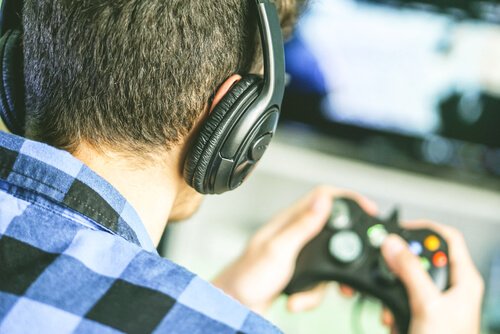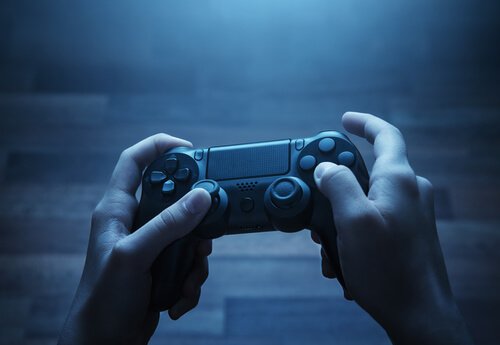Internet Gaming Disorder: What's it All About?

Lately, people have been demanding treatment for teenagers with Internet use problems. This is because it’s not uncommon to see young people suffering from disorders such as Internet gaming disorder.
Young people use the Internet to access a wide variety of content through multiple devices. Their main goals when surfing the web are making new friends, having fun, or learning.
However, in the last few years, different research has shown that inappropriate or excessive Internet use can have negative consequences. These consequences affect the daily life of the person or their family, other interpersonal relationships, or their emotional stability.
Internet gaming disorder: Is it real?
The Diagnostic and Statistical Manual of Mental Disorders (DSM-5) states that Internet addiction alone can’t be classified as a mental disorder. However, it proposes the existence of Internet gaming disorder. (American Psychiatric Association, 2013)
This has given place to different studies. Thanks to them, there’s enough evidence to affirm that an excessive use of video games can have worse of equal negative consequences than those of any other known addiction.

Diagnostic criteria
Here are the diagnostic criteria required to be able to diagnose someone with Internet gaming disorder, according to the DSM-5.
Repetitive use of Internet-based games, often with other players, that leads to clinically significant functioning issues. Five (or more) of the following criteria must be met within 12 months:
- Preoccupation with Internet games. (The individual thinks about previous gaming activity or anticipates playing the next game; Internet gaming becomes the dominant activity in daily life). Note: This disorder is distinct from Internet gambling, which is included under gambling disorder.
- Withdrawal symptoms when Internet gaming is taken away. (These symptoms are typically described as irritability, anxiety, or sadness, but there are no physical signs of pharmacological withdrawal).
- Tolerance: The need to spend increasing amounts of time engaged in Internet games.
- Unsuccessful attempts to control the participation in Internet games.
- Loss of interest in previous hobbies and entertainment as a result of, and with the exception of, Internet games.
- Continued excessive use of Internet games despite knowledge of psychosocial problems.
- Has deceived family members, therapists, or others regarding the amount of Internet gaming.
- Use of Internet games to escape or relieve a negative mood (e.g., feelings of helplessness, guilt, or anxiety).
- Has jeopardized or lost a significant relationship, job, or educational or career opportunity because of participation in Internet games.
This disorder includes only Internet games that aren’t related to gambling. It doesn’t include the use of the Internet to perform activities required in a business or profession. Additionally, this disorder doesn’t intend to include other recreational or social uses of the Internet.
Internet gaming disorder is similar to addiction
Internet gaming disorder is characterized by excessive and prolonged use of Internet-based games. It results in a group of cognitive and behavioral symptoms such as a progressive loss of control over games, tolerance, and withdrawal symptoms. These are similar to the symptoms of a substance use disorder.
As in substance-related disorders, people with Internet gaming disorder continue to sit in front of a computer playing online games even though they’re aware that they’re neglecting other important activities.
They usually spend about 8 to 10 hours per day and at least 30 hours per week performing this activity. If they’re restricted from using a computer or playing Internet games, they get agitated and angry. The severity of their addiction can lead them to spend long periods of time without eating or sleeping.

Social games that interfere with daily life
Another symptom of those suffering from Internet gaming disorder is that they disregard normal obligations such as schoolwork or family commitments. The essential characteristic of this disorder is a persistent and recurring participation in Internet games, typically group games, for many consecutive hours.
These games involve competition between groups or different players (who are, more often than not, in different parts of the world) who participate in complex and structured activities that involve social interaction.
Team spirit seems to be a key motivator in this disorder. People with this disorder automatically resist other people’s attempts to redirect them towards their school tasks or personal activities. That way, the individual rejects personal, familial, or vocational occupations.
On the other hand, respondents often say they use the computer to “avoid boredom” rather than to communicate or search for information. In some of the people who were studied, researchers found brain activation that was triggered by exposure to Internet games in specific regions that aren’t limited to the reward system.
A study conducted in China gave place to the description of the criteria related to this condition. The optimal criteria and threshold for diagnosis should still be determined empirically. Therefore, we recommend taking the information given in this article lightly.
If you think you have Internet gaming disorder, the best thing you can do is seek professional help. Don’t hesitate to go see a psychologist. They’ll be able to help you overcome this addiction and reduce its impact on your life.
This text is provided for informational purposes only and does not replace consultation with a professional. If in doubt, consult your specialist.








